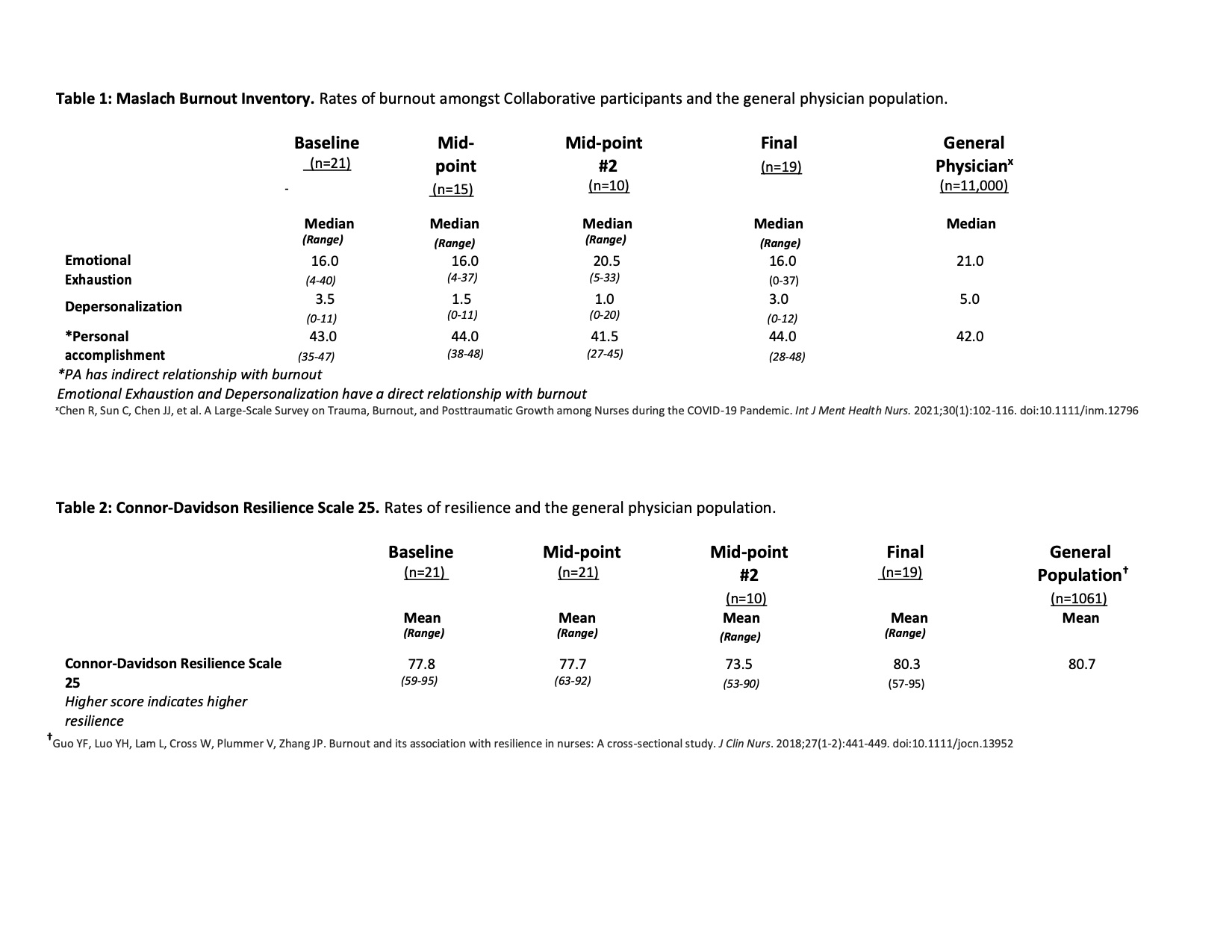Back
General Pediatrics: All Areas
Category: Abstract Submission
General Pediatrics I
598 - Participating in a Collaborative Promotes Provider Resilience: Results from the New Jersey Pediatric Advocacy Collaborative
Saturday, April 23, 2022
3:30 PM – 6:00 PM US MT
Poster Number: 598
Publication Number: 598.208
Publication Number: 598.208
Sara Horstmann, Levine Children's Hospital, Cornelius, NC, United States; Amy Louer, University of California, San Francisco, School of Medicine, San Francisco, CA, United States; Sara Bode, Nationwide Children's Hospital, Columbus, OH, United States
- SH
Sara Horstmann, MD (she/her/hers)
Associate Professor of Pediatrics
Levine Children's Hospital
Cornelius, North Carolina, United States
Presenting Author(s)
Background: Physician burnout is a looming public health crisis exacerbated by the recent COVID-19 pandemic. Institutional solutions to this phenomenon are required to tackle this costly problem. The New Jersey Pediatric Advocacy Collaborative (NJPAC) was formed in 2019 with a focus on improving and standardizing resident education in pediatric advocacy as well as fostering community partnerships.
Objective: This study aimed to evaluate the level of provider burnout over time in pediatric faculty participating in a multi-institutional pediatric advocacy collaborative and identify resilience promoting factors.
Design/Methods: Members of the collaborative were evaluated at the start, 2 midway points, and end of the two-year study period with the Maslach Burnout Inventory (MBI), Connor-Davidson Resilience Scale, and a focused survey assessing burnout and resiliency factors. Additionally, the impact of COVID on collaborative participants was assessed. Quantitative and qualitative analysis was performed.
Results: Members of the collaborative showed lower levels of burnout relative to the general physician population and had minimal decrease in burnout during the height of the Covid-19 pandemic (Table 1). Collaborative members also reported higher levels of resilience at the end of the study period (Table 2). Qualitative analysis demonstrated that participation in the collaborative promoted resilience by increasing meaning at work, increasing sense of professional accomplishment, and improving sense of connectedness to the community, peers, and the institution. Conclusion(s): These findings support the use of inter-institutional collaboratives as a system level strategy to mitigate provider burnout.
Tables 1 and 2
Objective: This study aimed to evaluate the level of provider burnout over time in pediatric faculty participating in a multi-institutional pediatric advocacy collaborative and identify resilience promoting factors.
Design/Methods: Members of the collaborative were evaluated at the start, 2 midway points, and end of the two-year study period with the Maslach Burnout Inventory (MBI), Connor-Davidson Resilience Scale, and a focused survey assessing burnout and resiliency factors. Additionally, the impact of COVID on collaborative participants was assessed. Quantitative and qualitative analysis was performed.
Results: Members of the collaborative showed lower levels of burnout relative to the general physician population and had minimal decrease in burnout during the height of the Covid-19 pandemic (Table 1). Collaborative members also reported higher levels of resilience at the end of the study period (Table 2). Qualitative analysis demonstrated that participation in the collaborative promoted resilience by increasing meaning at work, increasing sense of professional accomplishment, and improving sense of connectedness to the community, peers, and the institution. Conclusion(s): These findings support the use of inter-institutional collaboratives as a system level strategy to mitigate provider burnout.
Tables 1 and 2

